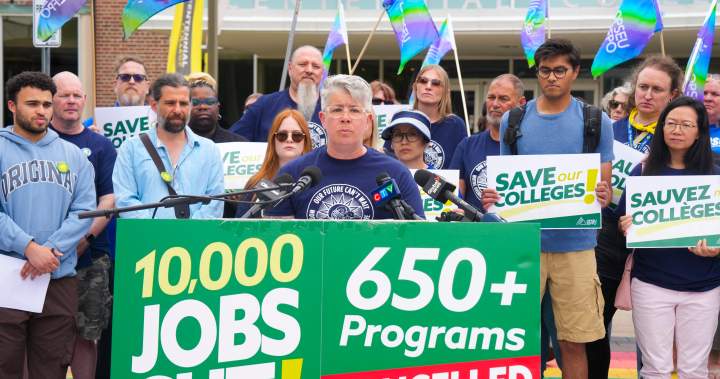In the shadow of final exams and approaching summer plans, Ontario’s college system stands at the precipice of significant disruption. With less than 24 hours remaining before a potential strike deadline, approximately 16,000 faculty members across the province’s 24 public colleges prepare to potentially walk off the job, leaving nearly 300,000 students in academic limbo.
Negotiations between the College Employer Council (CEC) and the Ontario Public Service Employees Union (OPSEU) have intensified in recent days, yet the two sides remain divided on several critical issues. Primary among these are workload formulas, job security for partial-load faculty, and intellectual property rights—concerns that have remained largely unresolved despite months of bargaining.
“The colleges continue to refuse addressing our core demands around workload and precarity,” said JP Hornick, chair of OPSEU’s college faculty bargaining team, during a press conference Wednesday afternoon. “Our members are facing unprecedented challenges in delivering quality education while juggling unrealistic workloads.”
The College Employer Council, representing Ontario’s 24 public colleges, maintains that their offer is fair and competitive within the sector. “We’ve put forward proposals that balance faculty concerns with fiscal responsibility and educational quality,” stated Graham Lloyd, CEO of the CEC. “A strike would be devastating for students who have already endured educational disruptions during the pandemic.”
This potential work stoppage comes at a particularly vulnerable time for students, many of whom are completing final exams or preparing for graduation ceremonies in the coming weeks. The Ontario Student Alliance has expressed grave concerns about the timing, noting that another disruption could have lasting impacts on academic progression and mental health.
For international students, who comprise a growing percentage of Ontario’s college population, the stakes are especially high. Many face visa considerations tied to continuous enrollment and cannot easily extend their stays in Canada if programs are delayed.
The province’s colleges have become increasingly dependent on international student tuition fees, which typically run three to four times higher than domestic rates. According to recent financial reports, international student fees now account for nearly 40 percent of operating revenue at some institutions.
The Ministry of Colleges and Universities has urged both sides to reach an agreement, though has thus far declined to intervene directly. “We expect both parties to negotiate in good faith and find solutions that avoid disruption to students’ education,” a ministry spokesperson told CO24.
This potential strike follows a pattern of labor tensions in Ontario’s education sector, coming just three years after the last college faculty work stoppage in 2021, which lasted two weeks. The previous major strike in 2017 stretched for five weeks, resulting in condensed semesters and modified exam schedules that affected student outcomes for months afterward.
Faculty members point to systemic issues that have worsened in recent years. “The increasing reliance on part-time instructors who lack job security while teaching the majority of classes has created an unsustainable model,” explained Dr. Maria Chen, a professor at Seneca College who spoke with CO24 News.
Students remain caught in the middle. “I’m supposed to graduate next month, and now I don’t know if that will happen,” said Priya Sharma, a final-year business administration student at Humber College. “We’ve already been through so much disruption with the pandemic. It feels like our education is constantly being compromised.”
As the clock ticks toward the midnight deadline, both sides have indicated they will continue negotiations. However, college administrators have begun implementing contingency plans, including postponing some exams and developing alternate delivery methods for essential programs.
As Ontario’s higher education system faces this critical juncture, a question looms larger than the strike itself: How can a college system increasingly driven by market forces continue to fulfill its foundational mandate of accessible, quality education when structural issues remain unresolved year after year?























